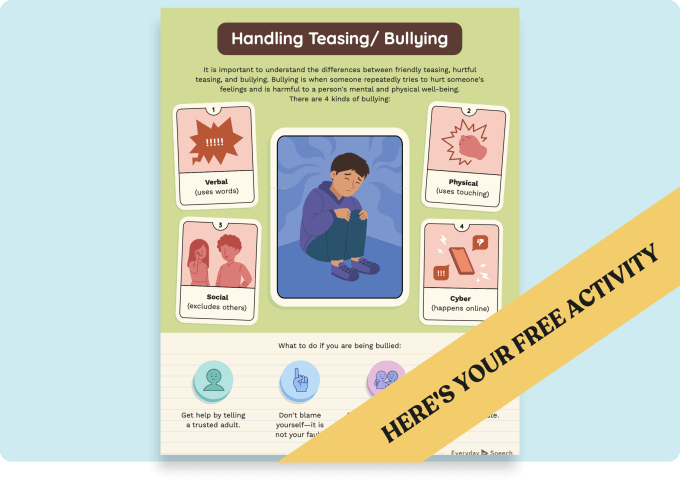Helping PreK Students Think Before They Speak: A Social-Emotional Learning Guide
Get free social skills materials
No-prep lessons on self-regulation, emotional recognition, conversation skills, and more.
Sign up hereIntroduction
Sometimes, people ask us questions and we’re not sure what to say. This can lead to misunderstandings and hurt feelings. In this blog post, we’ll introduce an easy, no-prep activity to help PreK students practice focusing and thinking before answering questions. By doing so, they can learn to communicate more effectively and develop stronger relationships with their peers.
No-Prep Activity: Focus and Respond
This simple activity requires no preparation or materials from the educator. It’s designed to help students practice focusing on questions and thinking before they respond. Here’s how it works:
- Pair up the students and have them sit facing each other.
- One student will ask the other a simple question, such as “What did you do this weekend?” or “What’s your favorite color?”
- The other student should take a moment to focus on the question, think about their response, and then answer the question.
- The students then switch roles and repeat the process.
- After a few rounds, encourage the students to share their experiences with the class. Discuss how focusing and thinking before responding helped them communicate more effectively.
By practicing this activity, students can learn to focus on the words of their peers and give thoughtful, meaningful responses, improving their communication skills and fostering positive interactions.
Discussion Questions
Use these questions to stimulate further discussion and reflection among students:
- How did it feel when your partner took the time to focus on your question and think before answering?
- How can focusing and thinking before responding help us in our daily conversations with friends and family?
- Why is it important to communicate effectively with others?
- Can you think of a time when you didn’t focus on a question and it led to a misunderstanding? How did that make you feel?
- How can we practice focusing and thinking before we respond to questions outside of the classroom?
Related Skills
Focusing and thinking before responding are just a few of the many skills that contribute to effective communication and positive relationships. Other relevant skills for students to develop include:
- Active listening
- Empathy
- Nonverbal communication
- Conflict resolution
- Collaboration and teamwork
By working on these skills, students can strengthen their social-emotional learning and become more adept at navigating various social situations.
Next Steps
To further explore activities and resources that promote social-emotional learning, we encourage you to sign up for free sample materials at Everyday Speech. These resources can help you introduce and reinforce a variety of skills, setting your students up for success in their social interactions and emotional well-being.

